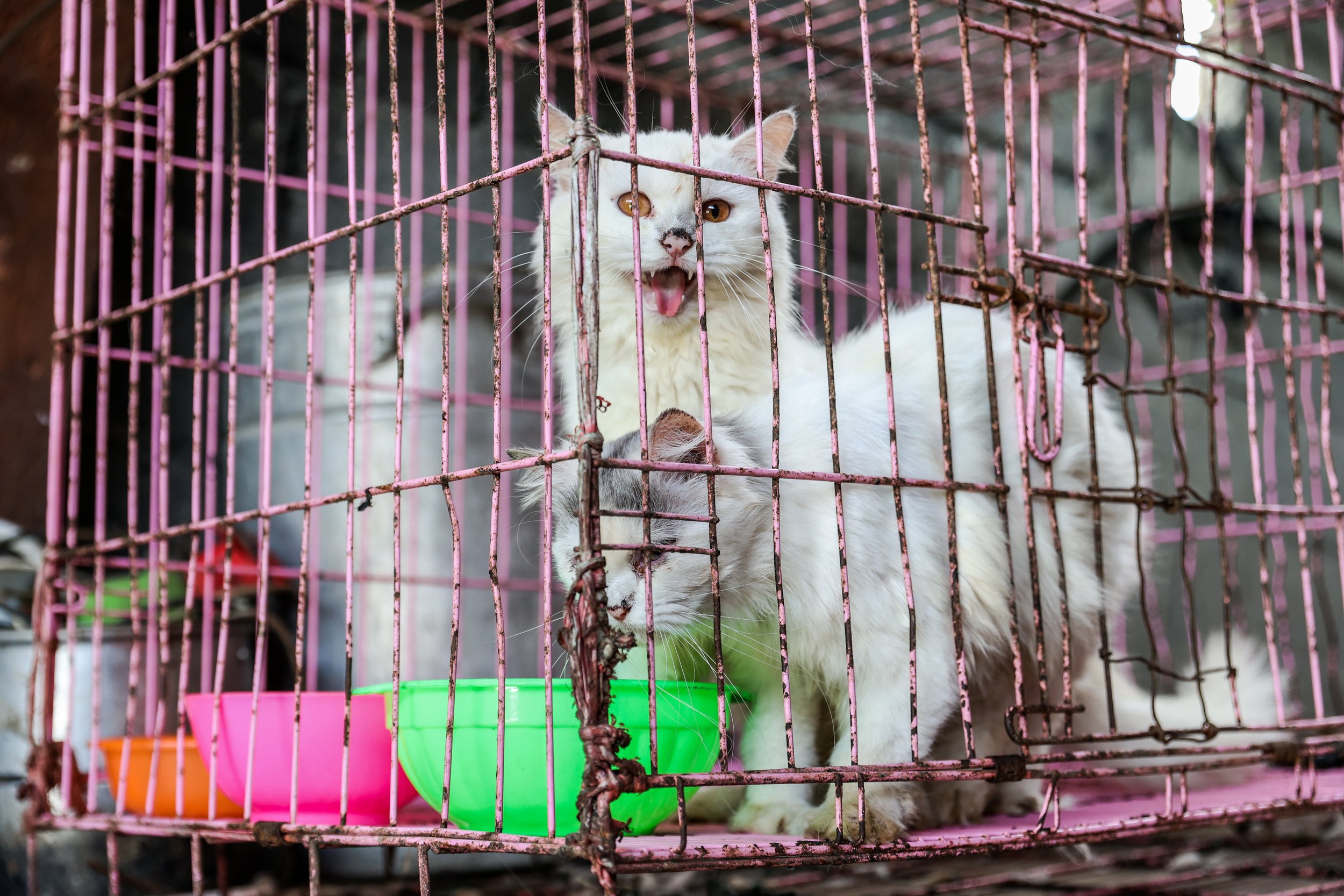Indonesia’s Notorious ‘Extreme’ Market Bans Dog and Cat Meat Trade
Campaigners rescue 25 dogs and 3 cats as the Tomohon Extreme Market finally closes its network of slaughterhouses.
Cats at the Tomohon Extreme Market, who are now safe at a sanctuary. Credit: HSI
A notorious live animal market in Indonesia has officially banned the dog and cat meat trade, in a move that campaigners say will spare thousands of animals from being bludgeoned to death for human consumption.
The Tomohon ‘Extreme’ Market has long been known as one of the most notorious markets in the world, having been listed as a gruesome must-see destination on tourist websites. At the market, live and slaughtered dogs and cats are sold alongside the likes of butchered pythons, bats, and rats.
Now, the last six remaining dog and cat traders have signed an historic agreement to permanently close and end all trafficking, slaughter, and sale of dogs and cats.
The mayor of Tomohon, Caroll Senduk, also signed into law a ban on all future dog and cat meat trading at the market because of its dangerous risk in spreading rabies.
As part of the ban, twenty five dogs and three cats were rescued at slaughterhouses that supplied the market. Rescuers from the Humane Society International (HSI) took the animals to a nearby partner sanctuary where they are receiving emergency veterinary treatment and care until they are ready to be adopted.
A cat being rescued from the market. Credit: HSI
“With Tomohon Extreme Market going dog and cat meat-free, in addition to the permanent closure of the slaughterhouses that killed hundreds of these animals every week, the impact will be far-reaching, shutting down business for the traders’ vast network of traffickers, dog thieves and slaughterers”, explained Lola Webber, the director of campaigns to end the dog meat trade at HSI.
HSI are now hopeful that the unprecedented agreement will set a new standard for other markets in the country to follow, as well as add pressure to the government to take more seriously the high public health risk posed by the dog and cat meat trade.
The trafficking of dogs between provinces and in densely populated cities is said to facilitate the spread of the deadly rabies virus. Rabies is rampant in many parts of Indonesia, and endemic in 29 out of 37 provinces. North Sulawesi Province, a hotspot for the dog and cat meat trade and where the Tomohon Extreme Market is based, has some of the highest rates of human deaths attributed to rabies in Indonesia every year.
Could Indonesia End Its Dog and Cat Meat Trade?
It is estimated that around 1 million dogs are killed in Indonesia each year.
Elvianus Pongoh, who has traded and slaughtered dogs and cats for meat at the Tomohon Extreme Market for over 25 years, told HSI that the time has come to end the trade. “If Indonesia is on a path towards banning the trade completely, then we at Tomohon have played a small part in making history”, Pongoh said.
The rescue team helping to save a dog from the market. Credit: HSI
Pongoh’s statement comes after Indonesia’s capital city of Jakarta introduced a city-wide ban on the trade earlier this year, which the Dog Meat Free Indonesia (DMFI) coalition labeled as a “historic and watershed moment”. Previous figures estimated that nearly 10,000 dogs were killed for their meat in Jakarta each month.
And public support for the trade is low, with an estimated 4.5 percent of Indonesia’s 270 million people estimated to have ever consumed dog meat. A nationwide opinion poll, conducted by Nielsen in 2021 and commissioned by DMFI, revealed 93% of all Indonesians support a national ban.
The Global Dog Meat Trade
An estimated 30 million dogs are killed for human consumption every year across Asia, according to HSI. In addition to those in Indonesia, this figure includes around 10-20 million dogs that are slaughtered in China, 2 million in South Korea, and around 5 million in Vietnam.
However, support for the trade is on the decline in the region, and there is a growing animal protection movement across Asia that opposes the consumption of dog and cat meat.
This trend has been reflected in the growing number of government bans on the practise in recent years. In 2020, Shenzhen became the first city in China to ban the consumption of dog and cat meat, and the Indian state of Nagaland, infamous for its ‘hidden’ dog meat trade, also recently announced a complete ban along with heightened legal enforcement.
Take action against the dog meat trade now by signing Species Unite’s petition to ban dog meat in Vietnam’s capital city of Hanoi.
We Have A Favor To Ask…
Species Unite amplifies well-researched solutions to some of the most abusive animal industries operating today.
At this crucial moment, with worldwide momentum for change building, it’s vital we share these animal-free solutions with the world - and we need your help.
We’re a nonprofit, and so to keep sharing these solutions, we’re relying on you - with your support, we can continue our essential work in growing a powerful community of animal advocates this year.
More stories:
Species Unite
A collection of stories of those who fight the good fight on behalf of animals.






Leather, wool, feathers: even if they were by-products, would that make a difference?